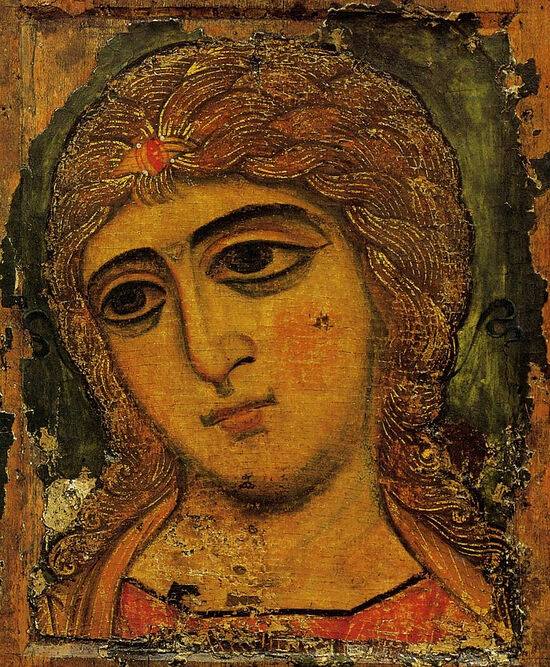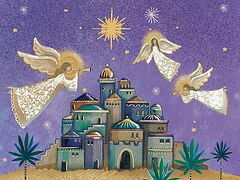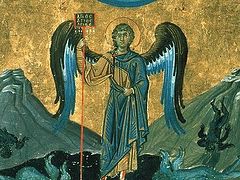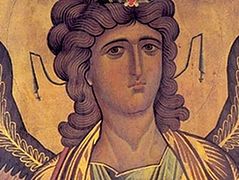The Vladikavkaz cathedral church, November 8, 1916
Although we often remember Christ, and pray to the Mother of God and the saints, aren’t God’s angels much further from our minds? We mostly remember them when the holy Church mentions them, but the rest of the time many of us forget about them and rarely pray to them.
Meanwhile, from God’s words we see that the angels ceaselessly serve for our salvation along with the God’s holy people, and in fact they rejoice in and take care of our salvation even more than we ourselves do. Christ is born, and instead of people, who did not know the hour of Christ’s coming to them, not even receiving Him Who “came unto His own” (Jn. 1:11), the angels laud the newborn Infant God with the wondrous song that we now repeat with spiritual exaltation: “Glory to God in the Highest, and on peace, good will toward men.” Christ is baptized, and after Baptism conquers the devil in the desert—and again we do not see people who would help Christ as He is tempted in His ascetic labors. Instead of people—who would later depart in droves for the desert in emulation of Christ’s ascetic feat—again only the angels serve Christ (cf. Mk. 1:13). Christ suffers in the Garden of Gethsemane, when His soul grieves unto death and He prays until He sweats blood, and again there are no people near to grieve with Him; only the angels strengthen Him (cf. Lk. 22:43). Even His closest disciples, Peter, James, and John, were in a heavy sleep, according to the Old Testament prophet’s words about Christ: And I waited for one that would grieve with me, but there was no one; and for them that would comfort me but I found none (Ps. 68:25). True, Peter wanted to raise his sword in Christ’s defense when the hour had come for Him to be betrayed into the hands of sinners, but that is not the kind of help that Christ sought as He suffered from people, having the possibility all the while to be delivered by more than twelve legions of angels (cf. Mt. 26:51–53). And the angels were the only witnesses to His glorious Resurrection; they tell the glad tidings of the Resurrection to the disciples who had scattered in fear and forgotten His words.
But how ceaseless and all-surpassing are the actions of angels in our own lives! For they continually desire to look into (1 Pet. 1:12) the mystery of our salvation; as our guardians, they surround each of “these little ones”; they rejoice over every sinner who repents more than over the ninety-nine righteous ones who have no need of repentance. For them the Lord prepares a table of spiritual festivity (Lk. 15:6–7, 23, 32) as for His close friends, when a person like the prodigal son in the parable was dead and now lives, was lost and is found. The Lord wants to build one Church out of them and us—the heavenly and the earthly; he wants to make us friends and cohabitants with the angels. For this He came down to earth, in order to take the lost sheep—the human race—upon His shoulders, and unite it with the angels, filling with people the ranks of angels who had fallen together with satan. And so, despite the angels’ close and ceaseless participation in the work of our salvation, despite their great and caring love for us, we take so little notice of them. Meanwhile the holy Church recalls them to us continually. The Church has established not only this bright feast day for the special glorification of the bodiless powers, but also every day suggests various prayers to the angels, and has appointed Monday as the day we particularly glorify them and pray for their intercessions. It is clear that being in the flesh, we close our eyes and fasten the eyes of our hearts to the earthly and visible. This is why we forget about the heavenly bodiless powers and their prayers and intercessions. They ignore their own heavenly grandeur and glory and are like servants, ever ready pray and intercede for us—but we rarely ask them for it.
But what a great loss it is to our spiritual life that we so rarely enter into spiritual communion with the heavenly angels! After all, for a person always living in the lowlands filled with toxic fumes, it is so necessary to move from time to time to a higher place with clean, mountain air. Illnesses are often even cured simply by sending the sick person to breathe purer, more healthy air.
We live in the lowlands of earthly, everyday passions; we breathe their toxic, poisonous fumes, constantly spending time in the lowlands and abysses of sin. How necessary it is for us to breathe in more often the higher, heavenly air of unadulterated sanctity, which the angels breathe all the time! Moreover, burdened with our heavy, lazy, weak, and passionate flesh, we are so infirm, so conquered by fleshly passions that we give in with barely a fight to the onslaught of the passions against our souls. The angels possess such a great spiritual fortress, are so readily moved to the good, so easily fly to where their help is needed! Therefore, we must pray more often, as the holy Church suggests: “We shall be zealous for the angelic life and force our thoughts to the heights, and with them immaterially sing unto the Lord!” That is why the holy God-pleasers always kept an image in their minds of the angelic manner of life as the most perfect example for emulation, and truly became like them, became “angels in the flesh”. And how greatly we need the angels’ help in our struggle with the spirit of evil! After all, this struggle is not “against flesh and blood” (Eph. 6:12); that is, not with weak people like ourselves, but with the spirits of evil, who are stronger than us and very devious, invisibly ready to harm us in any way possible. How could we not have run for help to the heavenly powers with the Archangel at the head, through whom even satan fell like lightning from the heavens (Lk. 10:18)? It is hard for us to enter straight into that immeasurable spiritual height, where God abides—the primary Light; and so the Lord created the angels—the “second light”, manifesting in them an as if intermediary step, which is much more accessible to us who bear the image of God. Although angels are spirits, they are nevertheless creatures and closer to us, and so it is easier for us fleshly ones to emulate them than God Himself directly, for He is the all-perfect, most pure Spirit. It is easier to rise to a relatively lower step on the on the ladder of existence, at the heights of which the Lord Himself is established.
But perhaps some will say: Why do we need the angels’ assistance when we have Christ God Himself, His Most Pure Mother, the Theotokos, who is more honorable than the Cherubim and more glorious beyond compare than the Seraphim? Aren’t they all-powerful and can help us in any need? The help of Christ, Who took on flesh like ours in order to be Himself tempted by everything that tempts us (Heb. 2:18; 4:15)—isn’t that enough for us? Yes, but even Christ appeared in our flesh so that by condescending to us, He makes it easier for us to rise to the heavenly heights of the angelic life. Therefore He did not remain on earth with the flesh, but ascended, so that we would also “set our affections on things above, and not on things on the earth” (cf. Col. 3:2). And the Mother of God also after death ascended with her body to her Son and God “to the Heavens and above the Heavens”, and during her earthly life, living in the temple and preparing to become the vessel that would contain the invisible God—wasn’t she more in contact with angels? Let us remember that “flesh and blood” cannot inherit the Kingdom of God, and that our bodies must be changed after the general resurrection, become “spiritual” in order to become participants in the Kingdom of Heaven (cf. 1 Cor. 15:44, 50). This means that Christ’s life on earth in the flesh, as also that of the Mother of God, also tells us how necessary it is to reach for communion with the angelic world. Of course, Christ is all-powerful to help us; but in saving beings who have the gift of freedom, He does not pull them forcibly into His Kingdom, but rather wants them to make use of their own free efforts to enter into it; so that they themselves, mutually helping each other in these efforts, would cooperate in the establishment of the Heavenly Kingdom. How can we manage this struggle for the establishment of Christ’s Kingdom without the help of the higher and mightier armies of the heavenly powers?
Let us call out more often and with greater effort to the angels for help, so that by associating with them, our spirits would be unburdened from the fleshly passions that draw us downward; so that like would more easily be drawn to like—to the heights, as everything light on earth rises up to the airy heights; so that it would be enough for us to fortify ourselves and hold on to those heights; and if torn away, we would not be drawn to the abyss where the demons and people like them are cast down by the weight of their own poisonous passions.




